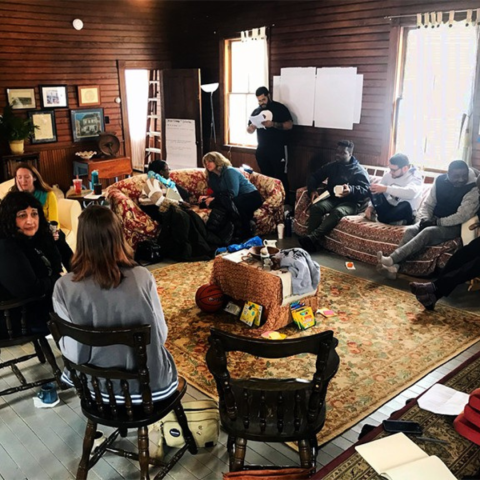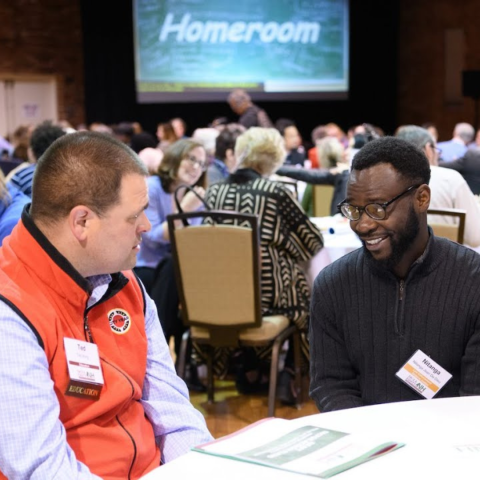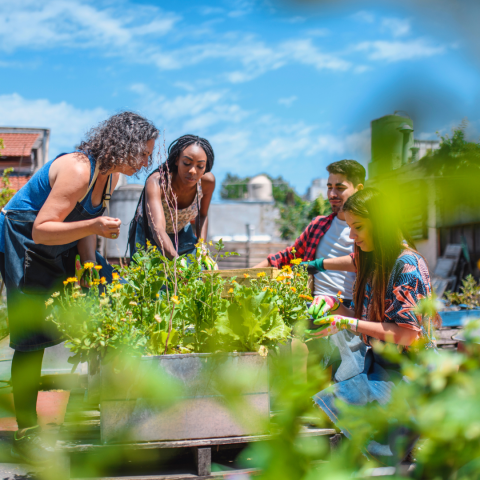Past Projects
For the past 18 months, a steering committee has engaged with educators, students and residents of New Hampshire’s Androscoggin Valley to identify and create the structures necessary to increase collaboration with regional school districts. Community stakeholders share input and feedback aimed at shaping a strategy for stronger, healthier relationships with school districts in New Hampshire’s North Country.
Role: Coaching and facilitating engagement components
Partners: Funded by the Nellie Mae Education Foundation with Berlin Public Schools (SAU 3), Gorham Public Schools (SAU 20)
Thanks to funding from the Democracy Fund, the Carsey School and Georgetown University’s Beeck Center for Social Impact & Innovation have partnered to explore how the U.S. Congress can become more inclusive during congressional field hearings. New Hampshire is rich with civic engagement, and this research will create opportunities to pilot ideas, methods and even develop new deliberative norms for both broader and more curated participation in Congress. This project will engage everyday citizens and experts on a contemporary issue of public concern.
Role: Lead designer of deliberation phase
Partners: UNH Carsey School of Public Policy, Beeck Center for Social Impact & Innovation at Georgetown University
GSS is a proposed AmeriCorps Service Program aimed at addressing the needs of the state’s aging population and the high cost of tuition for college and university students. GSS offers a multigenerational approach to promoting healthy futures, which the Corporation for National and Community Service identified as a priority need area. Participating New Hampshire high school graduates will take a ‘gap year’ between high school and college and can access tuition assistance at statewide colleges and universities. GSS participants will work on providing services to older adults, including home modifications, technical support, transportation, and social networking.
Role: Designer of planning meetings
Partners: Carsey School of Public Policy, the Center on Aging and Community Living, and the New Hampshire Theatre Project
SELT has formed a working group to explore and evaluate the management options for the Franklin-McElheny Preserve in Rollinsford and Dover. Management practices will center on containing the woolly adelgid insect infestation on the property.
Role: Facilitating the working group
Partners: South East Land Trust of New Hampshire (SELT)
Our work with partners ranges from short, medium, and long-term projects on a variety of issues.
Reach out to us to learn more!

supporting youth leadership
This is a long-term capacity building project funded by the New Hampshire Charitable Foundation and the Nellie Mae Education Foundation. Each component is designed to build capacity for youth leadership and action in participating organizations and in New Hampshire. Group activities, including retreats and monthly community of practice meetings, will focus on building competencies for the work, increasing connection in the field, and applying those to strengthen program models for greater youth voice and participation. This work lays a foundation to network existing and emerging groups to get to know each other and increase the likelihood of future collaboration to deepen youth empowerment and youth organizing. Participating organizations include: Change for Concord of The American Friends Service Committee-NH, Rural youth-led organizing–visioning a model for New Hampshire (led by former staff and alumni of Pittsfield Youth Voice of Pittsfield Listens), New Hampshire Youth Movement, Youth Success Project, and Young Organizers United of the Granite State Organizing Project.
This is a long-term capacity building project funded by the New Hampshire Charitable Foundation and the Nellie Mae Education Foundation. Each component is designed to build capacity for youth leadership and action in participating organizations and in New Hampshire. Group activities, including retreats and monthly community of practice meetings, will focus on building competencies for the work, increasing connection in the field, and applying those to strengthen program models for greater youth voice and participation. This work lays a foundation to network existing and emerging groups to get to know each other and increase the likelihood of future collaboration to deepen youth empowerment and youth organizing. Participating organizations include: Change for Concord of The American Friends Service Committee-NH, Rural youth-led organizing–visioning a model for New Hampshire (led by former staff and alumni of Pittsfield Youth Voice of Pittsfield Listens), New Hampshire Youth Movement, Youth Success Project, and Young Organizers United of the Granite State Organizing Project.

Community workshops – jaffrey, nH
On September 15, 2022, Jaffrey's Planning and Economic Development Department held a meeting to share information about constructing a bridge and two roundabouts to curb heavy traffic in the center of downtown. This meeting continued downtown planning efforts that started over a decade ago with an Advisory Committee. As the project moves forward in 2023, the committee and planning director wanted to provide opportunities for community engagement specific to revitalization – how to make downtown more welcoming, provided needed resources, and afford economic opportunities. The efforts would build upon Jaffrey's town vision.
On October 25 and November 10, 2022, New Hampshire Listens facilitated two workshops for community members with the following goals:
- Surface core values and priorities for revitalization work
- Create a vision for revitalization that would support strategic planning
- Generate ideas for actionable next steps
The three overarching questions for the evening workshops were:
- What are our priorities for Jaffrey's downtown?
- What do we as community members envision for revitalization?
- We want an inclusive community, what are some ways we can work together to include lesser heard people in envisioning what our downtown needs?
During the workshops, New Hampshire Listens helped keep time, facilitated group discussion, and made sure everyone who attended had a chance to contribute. Ninety people attended the sessions overall; with overlap of participants who joined both nights. Residents engaged together around downtown maps, priority statements from previous community engagement activities held by the town, and photos that inspired envisioning the future of Jaffrey's downtown. They took part in empathy mapping to think through what different types of community members may need or want. Learn more.
On September 15, 2022, Jaffrey's Planning and Economic Development Department held a meeting to share information about constructing a bridge and two roundabouts to curb heavy traffic in the center of downtown. This meeting continued downtown planning efforts that started over a decade ago with an Advisory Committee. As the project moves forward in 2023, the committee and planning director wanted to provide opportunities for community engagement specific to revitalization – how to make downtown more welcoming, provided needed resources, and afford economic opportunities. The efforts would build upon Jaffrey's town vision.
On October 25 and November 10, 2022, New Hampshire Listens facilitated two workshops for community members with the following goals:
- Surface core values and priorities for revitalization work
- Create a vision for revitalization that would support strategic planning
- Generate ideas for actionable next steps
The three overarching questions for the evening workshops were:
- What are our priorities for Jaffrey's downtown?
- What do we as community members envision for revitalization?
- We want an inclusive community, what are some ways we can work together to include lesser heard people in envisioning what our downtown needs?
During the workshops, New Hampshire Listens helped keep time, facilitated group discussion, and made sure everyone who attended had a chance to contribute. Ninety people attended the sessions overall; with overlap of participants who joined both nights. Residents engaged together around downtown maps, priority statements from previous community engagement activities held by the town, and photos that inspired envisioning the future of Jaffrey's downtown. They took part in empathy mapping to think through what different types of community members may need or want. Learn more.

endowment for health, race & equity
With leadership and support from the Endowment for Health, the Race & Equity in New Hampshire Series focused on advancing the understanding of why race and equity matter for New Hampshire and addressing inequities for the betterment of our state and residents. The series addressed race and equity in six specific sectors: Civic Engagement, Economic Development, Education, Government, Health, and Law Enforcement/Criminal Justice. These sectors were identified at the October 2017 Inaugural Symposium on Race & Equity in New Hampshire. New Hampshire Listens fellows and staff were part of the planning, facilitation, and advisory teams for this long-term project. Learn more.
With leadership and support from the Endowment for Health, the Race & Equity in New Hampshire Series focused on advancing the understanding of why race and equity matter for New Hampshire and addressing inequities for the betterment of our state and residents. The series addressed race and equity in six specific sectors: Civic Engagement, Economic Development, Education, Government, Health, and Law Enforcement/Criminal Justice. These sectors were identified at the October 2017 Inaugural Symposium on Race & Equity in New Hampshire. New Hampshire Listens fellows and staff were part of the planning, facilitation, and advisory teams for this long-term project. Learn more.

HIV: harm reduction and rural health
This four-season educational Town Hall series was hosted through online gatherings from September through December 2020. It culminated on World AIDS Day, December 1. The series included national and regional public health speakers to raise awareness of the risks of HIV and infectious disease outbreaks in rural communities, as well as share strategies to reduce harm, including Narcan and Syringe Service Programs. New Hampshire Listens brought resources and expertise to design the online gatherings. The purpose was to create informative and engaging sessions that would bring community stakeholders together to spark ideas for future collaborative work. In a region that continues to experience challenges related to opioid use, engaging in the difficult conversations about HIV/AIDS, viral Hepatitis, and other infectious diseases in northern New Hampshire can help to decrease stigma and increase prevention and promotion of other harm-reducing strategies. Learn more.
This four-season educational Town Hall series was hosted through online gatherings from September through December 2020. It culminated on World AIDS Day, December 1. The series included national and regional public health speakers to raise awareness of the risks of HIV and infectious disease outbreaks in rural communities, as well as share strategies to reduce harm, including Narcan and Syringe Service Programs. New Hampshire Listens brought resources and expertise to design the online gatherings. The purpose was to create informative and engaging sessions that would bring community stakeholders together to spark ideas for future collaborative work. In a region that continues to experience challenges related to opioid use, engaging in the difficult conversations about HIV/AIDS, viral Hepatitis, and other infectious diseases in northern New Hampshire can help to decrease stigma and increase prevention and promotion of other harm-reducing strategies. Learn more.

Judge William w. treat fellowship
The Treat Fellowship program was established at the University of New Hampshire in 2018 in memory of the late New Hampshire Judge William W. Treat to provide students with a platform for engaging in civil discourse around social and political political differences. Treat Fellows conduct meaningful conversations on promoting equity, diversity, and shared understanding with individuals from different social identities. Fellowship recipients receive a stipend of $1,000 for a semester for the active engagement in the program (100 hours to be completed by the end of the semester) with New Hampshire Listens. Treat Fellows assist in the desing and facilitation of Campus Conversations, Policy Deliberations and Dialogue programs. Learn more.
The Treat Fellowship program was established at the University of New Hampshire in 2018 in memory of the late New Hampshire Judge William W. Treat to provide students with a platform for engaging in civil discourse around social and political political differences. Treat Fellows conduct meaningful conversations on promoting equity, diversity, and shared understanding with individuals from different social identities. Fellowship recipients receive a stipend of $1,000 for a semester for the active engagement in the program (100 hours to be completed by the end of the semester) with New Hampshire Listens. Treat Fellows assist in the desing and facilitation of Campus Conversations, Policy Deliberations and Dialogue programs. Learn more.

Local civic health research
In 2022, the Local Civic Health: A Guide to Building Community and Bridging Divides was released to the public. New Hampshire Listens and the Carsey School of Public Policy researchers, along with community partners are learning about how to talk about and learn more about local civic health in New Hampshire communities. Civic health includes factors such as how much people trust each other, show up at public meetings, get involved, vote and help neighbors. The Carsey School has designed a guide to help people at the local level collect data to better understand what factors bring people together or push them apart. We all want to live in a place we feel good about.
In times of crisis, we want our neighbors to help each other navigate the hard times. Civic Health information is helpful in supporting communities and democracy at the local level. If we understand the civic health of community, we can reduce polarization and encourage trust, resiliency, and connection. We have created a guide that gives communities different tools and resources to help assess local civic health and strengthen it.
In this video, New Hampshire Listens explores the guide that provides communities with tools and resources to help them learn about their community's local civic health and take action to strengthen it. Learn more or reach out to us if you want to develop a project.
In 2022, the Local Civic Health: A Guide to Building Community and Bridging Divides was released to the public. New Hampshire Listens and the Carsey School of Public Policy researchers, along with community partners are learning about how to talk about and learn more about local civic health in New Hampshire communities. Civic health includes factors such as how much people trust each other, show up at public meetings, get involved, vote and help neighbors. The Carsey School has designed a guide to help people at the local level collect data to better understand what factors bring people together or push them apart. We all want to live in a place we feel good about.
In times of crisis, we want our neighbors to help each other navigate the hard times. Civic Health information is helpful in supporting communities and democracy at the local level. If we understand the civic health of community, we can reduce polarization and encourage trust, resiliency, and connection. We have created a guide that gives communities different tools and resources to help assess local civic health and strengthen it.
In this video, New Hampshire Listens explores the guide that provides communities with tools and resources to help them learn about their community's local civic health and take action to strengthen it. Learn more or reach out to us if you want to develop a project.

New Hampshire civic health state index
The 2020 New Hampshire Civic Health Index (2020 Index) builds on previous Indices published in 2006, 2009, and 2013. Taking stock of New Hampshire's civic well-being makes sense in light of the changes that state has experienced in recent years. Understanding civic habits and who participates and who does not is critical to the physical, economic, and political health of our state. This is especially important to understand the experiences of people who have historically participated less in public life, due to systemic barriers and discrimination or due to choice, and whose voices are less likely to be heard when public decisions are being made. The global pandemic as well as a resurgence of activism focused on racial and social justice can effect the ways people interact, look out for each other, and work to make communities more inclusive and equitable.
Civic Health Indices provide an overarching, data-informed picture of (1) How we trust and engage with each other, (2) How we participate in community and politics, and (3) How different demographic groups participate in civic life.
The rollout event for the 2020 New Hampshire Civic Health Index was held March 25, 2020, and included members of the Carsey School, NH Listens, the National Conference on Citizenship, and the Civic Health Advisory Council. Learn more.
The 2020 New Hampshire Civic Health Index (2020 Index) builds on previous Indices published in 2006, 2009, and 2013. Taking stock of New Hampshire's civic well-being makes sense in light of the changes that state has experienced in recent years. Understanding civic habits and who participates and who does not is critical to the physical, economic, and political health of our state. This is especially important to understand the experiences of people who have historically participated less in public life, due to systemic barriers and discrimination or due to choice, and whose voices are less likely to be heard when public decisions are being made. The global pandemic as well as a resurgence of activism focused on racial and social justice can effect the ways people interact, look out for each other, and work to make communities more inclusive and equitable.
Civic Health Indices provide an overarching, data-informed picture of (1) How we trust and engage with each other, (2) How we participate in community and politics, and (3) How different demographic groups participate in civic life.
The rollout event for the 2020 New Hampshire Civic Health Index was held March 25, 2020, and included members of the Carsey School, NH Listens, the National Conference on Citizenship, and the Civic Health Advisory Council. Learn more.

participatory budgeting–Portland, ME
In 2022, Portland Empowered and New Hampshire Listens discussed opportunities to introduce participatory budgeting concepts to community members in Portland, ME. These sessions would focus on parent engagement and youth engagement. Portland Empowered and New Hampshire Listens hosted three workshops coined 'pre-PB,' which focused on fundamentals of participatory budgeting, local issues and policy, and team building. Following these sessions, the Portland Empowered team is looking to create actionable pathways for community members to address challenges and develop solutions through continued community education and engagement programming with New Hampshire Listens and other local partners. During these workshops, New Hampshire Listens assisted in timekeeping, facilitating group discussion, and ensuring that all participants were able to contribute to the conversation. Participants engaged together around thoughtful discussions and immersive activities. Due to the overarching theme of participatory budgeting, at the end of the sessions, participants were able to create a small-scale PB event, in which they voted on the project that would be 'funded.' Reach out to us if you want to learn more about our Participatory Budgeting engagement series, or learn more here.
In 2022, Portland Empowered and New Hampshire Listens discussed opportunities to introduce participatory budgeting concepts to community members in Portland, ME. These sessions would focus on parent engagement and youth engagement. Portland Empowered and New Hampshire Listens hosted three workshops coined 'pre-PB,' which focused on fundamentals of participatory budgeting, local issues and policy, and team building. Following these sessions, the Portland Empowered team is looking to create actionable pathways for community members to address challenges and develop solutions through continued community education and engagement programming with New Hampshire Listens and other local partners. During these workshops, New Hampshire Listens assisted in timekeeping, facilitating group discussion, and ensuring that all participants were able to contribute to the conversation. Participants engaged together around thoughtful discussions and immersive activities. Due to the overarching theme of participatory budgeting, at the end of the sessions, participants were able to create a small-scale PB event, in which they voted on the project that would be 'funded.' Reach out to us if you want to learn more about our Participatory Budgeting engagement series, or learn more here.

voice, engagement, and equity in schools
New Hampshire Listens works with school districts to strengthen and integrate authentic engagement of students, families, and community organizations into the life and operation fo a school. We support school and community engagement to build innovative approaches to teaching and learning aimed at meeting the needs of all students. Project components include organizing school board orientatinos and professional development workshops with educators and shchool leaders; engaging with students, and facilitating community-wide dialogues. New Hampshire Listens coached community partners and school leaders to build their engagement practices, youth voice, and school-family and school-community partnerships.
New Hampshire Listens works with school districts to strengthen and integrate authentic engagement of students, families, and community organizations into the life and operation fo a school. We support school and community engagement to build innovative approaches to teaching and learning aimed at meeting the needs of all students. Project components include organizing school board orientatinos and professional development workshops with educators and shchool leaders; engaging with students, and facilitating community-wide dialogues. New Hampshire Listens coached community partners and school leaders to build their engagement practices, youth voice, and school-family and school-community partnerships.
xx
Understanding Civic Health
In the same way that doctors conduct an annual check-up to assess our health, we can collect information to assess the civic health of our communities. Civic health includes factors such as how much people trust each other, show up at public meetings, get involved, vote, and help neighbors. The Carsey School has designed a guide to help people at the local level collect data to better understand what factors bring people together or push them apart.

2024 New Hampshire Civic Health Report
This report focuses on the civic health of New Hampshire from 2019 through 2024 using a specific set of indicators. The intent behind this report is that the data at the state level can be used to help both the state overall and local communities strengthen civic health.

2022 Local Civic Health Guide
The Carsey School has developed a guide and updates the Civic Health statewide report regularly to help people at the local level collect data and to better understand what factors bring people together or push them apart.
Understanding Civic Health
In the same way that doctors conduct an annual check-up to assess our health, we can collect information to assess the civic health of our communities. Civic health includes factors such as how much people trust each other, show up at public meetings, get involved, vote, and help neighbors. The Carsey School has designed a guide to help people at the local level collect data to better understand what factors bring people together or push them apart.
